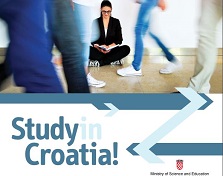Dear visitors of the STUDY IN CROATIA portal,
It is with great pleasure that I address you on the occasion of the 300th anniversary of the birth of Ruđer Bošković, a Croatian scientist who, like all true visionaries, was eventually recognised by history.
If one were to ask Europeans of average education about Ruđer Bošković, I am sure that their responses would contain not even the most basic biographical information about him. In this respect, Bošković cannot be compared to Descartes, Galileo, Newton, Leibniz and other great thinkers of the modern age. However, and in strong contrast to this, the fact remains that Croatian and European science are indebted to Bošković's multi-faceted scientific dimension, which is still highly influential in many fields, and that Bošković’s work has succeeded in earning its place on the world map of science thanks to its critical spirit, its credibility and its thoroughness.
Ruđer Bošković, whose scientific work was developed over five decades, demonstrated a fundamentally different understanding of space and time to that of many of his renowned contemporaries. At a time when the Enlightenment was placing an increasingly clear and spirited emphasis on a sensual, materialistic and aesthetic view of the world, Bošković confidently removed himself from such a superficial understanding, and, rising above his immediate environment and the historic context itself, offered a fundamentally different understanding. This allowed him to trace new paths into the development of the human universe and to fight against all attempts to negate truth and equality. A monument to this great Croatian genius was erected by Bošković himself, in the form of more than 75 major works on mathematics, mechanics, astronomy, optics, philosophy and literature. Bošković, however, also considered all works of man to be expendable and transient.
Every anniversary represents an occasion to send a message about a society’s value system, to demonstrate our relation to the past through our relation to the present. In other words, the present and past enlighten each other and every time we deal with the past we are also searching for an interpretation of the present.
The link between knowledge and social development is especially notable in the times we live in. Today, ensuring a successful future relies on a society characterising itself by a culture of knowledge, including among others a knowledge economy. This trend of dependence on knowledge – on the advancement, spreading and acceptance of knowledge – is increasingly widespread and is becoming a focal point. Science, as a creator of new knowledge, is the central initiator of development: it is an activity which meets the needs of society, especially in the fields related to work and to the general quality of life. Science and related technological solutions are a central resource for creating a prosperous society. In fact, the growth of prosperity is based on the work of scientists who create and apply new knowledge and transfer it to future generations. In the Republic of Croatia, however, the existing levels of competence, creativity, effectiveness, responsibility and competitiveness of scientific work, despite notable individual achievements, do not correspond to the needs of accelerated social development. Without urgent and far-reaching changes, the current level of creation, application and spreading of new knowledge will not result in the achievement of prosperity. In this sense, the legal, organisational and financial reform of science in Croatia, both its research and educational components, is a necessity in order for Croatia to truly remain a part of Europe, as well as a part the developed world. We envision the future of Croatia among the developed countries of Europe and the developed world, and today there is not a single country that can guarantee to its citizens the achievement of prosperity, democracy and human rights without turning its fullest attention to the development of science and training.
This is the message that Ruđer Bošković sends us today in this place – both directly, through his life, and indirectly, through his works. His excellence, his commitment and his European roots are both a message and a call to our generation, while his genius and the constant contemporary relevance of his work remain our inspiration.
Radovan Fuchs, PhD
Former Minister of Science, Education and Sports
(In office 2 July 2009 - 23 December 2011)




